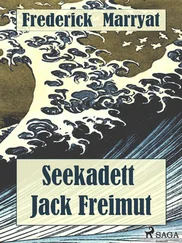Frederick Marryat - Phantom Ship
Здесь есть возможность читать онлайн «Frederick Marryat - Phantom Ship» — ознакомительный отрывок электронной книги совершенно бесплатно, а после прочтения отрывка купить полную версию. В некоторых случаях можно слушать аудио, скачать через торрент в формате fb2 и присутствует краткое содержание. Год выпуска: 0101, Жанр: foreign_antique, foreign_prose, на английском языке. Описание произведения, (предисловие) а так же отзывы посетителей доступны на портале библиотеки ЛибКат.
- Название:Phantom Ship
- Автор:
- Жанр:
- Год:0101
- ISBN:нет данных
- Рейтинг книги:4 / 5. Голосов: 1
-
Избранное:Добавить в избранное
- Отзывы:
-
Ваша оценка:
- 80
- 1
- 2
- 3
- 4
- 5
Phantom Ship: краткое содержание, описание и аннотация
Предлагаем к чтению аннотацию, описание, краткое содержание или предисловие (зависит от того, что написал сам автор книги «Phantom Ship»). Если вы не нашли необходимую информацию о книге — напишите в комментариях, мы постараемся отыскать её.
Phantom Ship — читать онлайн ознакомительный отрывок
Ниже представлен текст книги, разбитый по страницам. Система сохранения места последней прочитанной страницы, позволяет с удобством читать онлайн бесплатно книгу «Phantom Ship», без необходимости каждый раз заново искать на чём Вы остановились. Поставьте закладку, и сможете в любой момент перейти на страницу, на которой закончили чтение.
Интервал:
Закладка:
“No! Amine, I have not been mistaken, either in the summons, or in my own courage, or in my selection of a wife,” replied Philip, mournfully, as he embraced her. “It is the will of Heaven.”
“Then may its will be done,” replied Amine, rising from her seat. “The first pang is over. I feel better now, Philip. Your Amine knows her duty.”
Philip made no reply; when, after a few moments, Amine continued —
“But one short week, Philip — ”
“I would it had been but one day,” replied he; “it would have been long enough. He has come too soon — the one-eyed monster.”
“Nay, not so, Philip. I thank him for the week — ’tis but a short time to wean myself from happiness. I grant you, that were I to teaze, to vex, to unman you with my tears, my prayers, or my upbraidings (as some wives would do, Philip), one day would be more than sufficient for such a scene of weakness on my part, and misery on yours. But, no, Philip, your Amine knows her duty better. You must go like some knight of old to perilous encounter, perhaps to death; but Amine will arm you, and show her love by closing carefully each rivet to protect you in your peril, and will see you depart full of hope and confidence, anticipating your return. A week is not too long, Philip, when employed as I trust I shall employ it — a week to interchange our sentiments, to hear your voice, to listen to your words (each of which will be engraven on my heart’s memory), to ponder on them, and feed my love with them is your absence and in my solitude. No! no! Philip; I thank God that there is yet a week.”
“And so do I, then, Amine! and, after all, we knew that this must come.”
“Yes! but my love was so potent, that it banished memory.”
“And yet, during our separation, your love must feed on memory, Amine.”
Amine sighed. Here their conversation was interrupted by the entrance of Mynheer Poots, who, struck with the alteration in Amine’s radiant features, exclaimed, “Holy prophet! what is the matter now?”
“Nothing more than what we all knew before,” replied Philip; “I am about to leave you — the ship will sail in a week.”
“Oh! you will sail in a week?”
There was a curious expression in the face of the old man as he endeavoured to suppress, before Amine and her husband, the joy which he felt at Philip’s departure. Gradually he subdued his features into gravity, and said —
“That is very bad news, indeed.”
No answer was made by Amine or Philip, who quitted the room together.
We must pass over this week, which was occupied in preparations for Philip’s departure. We must pass over the heroism of Amine, who controlled her feelings, racked as she was with intense agony at the idea of separating from her adored husband. We cannot dwell upon the conflicting emotions in the breast of Philip, who left competence, happiness, and love, to encounter danger privation, and death. Now, at one time, he would almost resolve to remain, and then at others, as he took the relic from his bosom, and remembered his vow registered upon it, he was nearly as anxious to depart. Amine, too, as she fell asleep in her husband’s arms, would count the few hours left them; or she would shudder, as she lay awake and the wind howled, at the prospect of what Philip would have to encounter. It was a long week to both of them, and, although they thought that time flew fast, it was almost a relief when the morning came that was to separate them; for, to their feelings, which, from regard to each other, had been pent up and controlled they could then give vent; their surcharged bosoms could be relieved; certainty had driven away suspense, and hope was still left to cheer them and brighten up the dark horizon of the future.
“Philip,” said Amine, as they sat together with their hands entwined, “I shall not feel so much when you are gone. I do not forget that all this was told me before we were wed, and that for my love I took the hazard. My fond heart often tells me that you will return; but it may deceive me — return you may, but not in life. In this room I shall await you; on this removed to its former station, I shall sit; and if you cannot appear to me alive, O refuse me not, if it be possible, to appear to me when dead. I shall fear no storm, no bursting open of the window. O no! I shall hail the presence even of your spirit. Once more: let me but see you — let me be assured that you are dead — and then I shall know that I have no more to live for in this world, and shall hasten to join you in a world of bliss. Promise me, Philip.”
“I promise all you ask, provided Heaven will so permit; but, Amine,” and Philip’s lips trembled, “I cannot — merciful God! I am indeed tried. Amine, I can stay no longer.”
Amine’s dark eyes were fixed upon her husband — she could not speak — her features were convulsed — nature could no longer hold up against her excess of feeling — she fell into his arms, and lay motionless. Philip, about to impress a last kiss upon her pale lips, perceived that she had fainted.
“She feels not now,” said he, as he laid her upon the sofa; “it is better that it should be so — too soon will she awake to misery.”
Summoning to the assistance of his daughter Mynheer Poots, who was in the adjoining room, Philip caught up his hat, imprinted one more fervent kiss upon her forehead, burst from the house, and was out of sight long before Amine had recovered from her swoon.
Chapter Eight
Before we follow Philip Vanderdecken in his venturous career, it will be necessary to refresh the memory of our readers, by a succinct recapitulation of the circumstances that had directed the enterprise of the Dutch towards the country of the East, which was now proving to them a source of wealth, which they considered as inexhaustible.
Let us begin at the beginning. Charles the Fifth, after having possessed the major part of Europe, retired from the world for reasons best known to himself, and divided his kingdoms between Ferdinand and Philip. To Ferdinand he gave Austria and its dependencies; to Philip, Spain; but to make the division more equal and palatable to the latter, he threw the Low Countries, with the few millions vegetating upon them, into the bargain. Having thus disposed of his fellow-mortals much to his own satisfaction, he went into a convent, reserving for himself a small income, twelve men, and a pony. Whether he afterwards repented his hobby, or mounted his pony is not recorded; but this is certain — that in two years he died.
Philip thought (as many have thought before and since) that he had a right to do what he pleased with his own. He therefore took away from the Hollanders most of their liberties: to make amends, however, he gave them the Inquisition; but the Dutch grumbled, and Philip, to stop their grumbling, burnt a few of them. Upon which the Dutch, who are aquatic in their propensities, protested against a religion which was much too warm for their constitutions. In short, heresy made great progress; and the duke of Alva was despatched with a large army to prove to the Hollanders that the Inquisition was the very best of all possible arrangements, and that it was infinitely better that a man should be burnt for half an hour in this world than for an eternity in the next.
This slight difference of opinion was the occasion of a war which lasted about eighty years, and which, after having saved some hundreds of thousands the trouble of dying in their beds, at length ended in the Seven United Provinces being declared independent. — Now we must go back again.
For a century after Vasco de Gama had discovered the passage round the Cape of Good Hope, the Portuguese were interfered with by other nations. At last the adventurous spirit of the English nation was roused. The passage to India by the Cape had been claimed by the Portuguese as their sole right: they defended it by force. For a long time no private company ventured to oppose them, and the trade was not of that apparent value to induce any government to embark in a war upon the question. The English adventurers, therefore, turned their attention to the discovery of a north-west passage to India, with which the Portuguese could have no right to interfere, and in vain attempts to discover that passage the best part of the fifteenth century was employed. At last they abandoned their endeavours, and resolved no longer to be deterred by the Portuguese pretensions.
Читать дальшеИнтервал:
Закладка:
Похожие книги на «Phantom Ship»
Представляем Вашему вниманию похожие книги на «Phantom Ship» списком для выбора. Мы отобрали схожую по названию и смыслу литературу в надежде предоставить читателям больше вариантов отыскать новые, интересные, ещё непрочитанные произведения.
Обсуждение, отзывы о книге «Phantom Ship» и просто собственные мнения читателей. Оставьте ваши комментарии, напишите, что Вы думаете о произведении, его смысле или главных героях. Укажите что конкретно понравилось, а что нет, и почему Вы так считаете.












